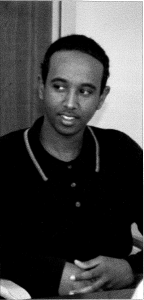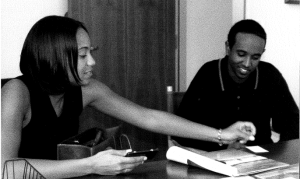Casa Cornelia’s Development office is about as far away from a courtroom as you can get, so when Rose suggested I attend an asylum hearing, I was thrilled. My assignment was to sit in the courtroom and take notes. “Don’t show any emotion, no matter what happens,” Rose warned. “If you feel your emotions start to well-up, just look down and start writing. Write anything to get your mind off the testimony, but don’t react. It doesn’t go over well with the judge.” I promised to behave and took my seat in the galley. Rose took her seat next to Brittany Little, Kamil’s volunteer attorney from Heller Ehrman, then turned back and gave me a reassuring smile.

I knew asylum detainees were handcuffed (I had read this in past editions of La Mancha). Still, nothing prepared me as Kamil, feet shackled, thin arms handcuffed behind his back, was escorted into the courtroom by an armed deputy.
He was a child! Twenty-two to be exact, but still, so young, and so fragile. My motherly instincts kicked in. I gripped my pen and started to scribble.
The interpreter took his seat. Court was in session and Kamil’s story began to unfold . . .
He was born into a loving home in Hamar-weyne, Mogadishu. His father, Omar, owned a grocery store and his mother, Ashia, cared for Kamil, his brother, Ahmed, and his sister Juweria . . . .As the events of his young life were unveiled, I realized; Kamil was not a child—he lost his child
hood when he was seven-years old.
1991 Age 7
Somalia descended into civil war . . .
“. . . There was heavy fighting in our neighborhood. That morning, due to the violence, my father decided to stay at home with the family instead of going to work in his grocery store. Later that afternoon, he decided to go to the store to get food and supplies for the family. As he approached the store, he saw several members of the Hawiye militia . . . The men took my father into his store, sat him down, and tied him up. Once he was tied down, the men opened fire on my father and killed him . . . Once we learned what happened, my family went to my father’s store, collected his body, and buried him in our backyard.”
1991-1994 Age 7-11
For the next three years, Kamil and his family became prisoners in their own home . . .
“Our mother told us that we would be killed like our father if we ventured outdoors because of our clan membership . . . From the inside of our home, we could hear machine gunfire. This was very scary, and when we heard it, we feared the Hawiye would come to kill us. During this time, we tried to be very quiet and not make too much noise. One evening we were eating dinner when we heard a knock at the front gate. There was a group of Hawiye men who broke down the gate.”
The gunmen beat Kamil and his brother and repeatedly raped his 14-year old sister. They tortured Kamil, burning him with molten plastic, then killed his brother. Kamil, together with his mother and sister, fled to a refugee camp in Kenya, where they lived with other refugees in a shack made of wood and plastic. One night, a group of militia men came across the border from Somalia and attacked the camp.
“On this particular night, the men attacked our neighbor. He was able to escape, but my sister was not as lucky. One of the bullets that had been fired struck my sister near her kidney as she lay sleeping in the house. We were able to get her to the hospital, but it was too late and she died.”
Kamil and his mother fled the camp in Kenya for the Utange Refugee Camp near Nairobi, where they joined Kamil’s maternal aunt.
Age 12-14 1994-1995
Not long after they arrived, the Utange Camp closed . . .
“I knew returning to Somalia was not an option. We had already suffered so much and because of our clan membership, we would not be safe from majority clan attacks on us. As a result, we went to another refugee camp called Benadiri.”
Kamil’s mother grew ill while at the Benadiri camp. He skipped school so he could care for her, but she could not hold on. Kamil was told her death was “due to a combination of her illness, high blood pressure and a heart attack.” One wonders if she died from a broken heart.
The Benadiri camp closed the same year Kamil’s mother died. Once again, Kamil found himself displaced and on the move.
Age 14-21 1995-2004
Kamil lived with his aunt and his cousins in Nairobi for several years. Because he was undocumented, he was constantly harassed by the police. Then, in 2004, Kamil’s aunt delivered yet another blow . . .
“My aunt’s processing was completed and she and her daughters were able to join her son in Norway. I was not able to go with them because my cousin could not lie and say that his mother was in Nairobi with two daughters and a son. My aunt promised that she would do whatever she could to help me.”
Kamil rented a room in Nairobi with two other Somali men and managed to survive by eating only once a day. Eventually, his aunt was able to send money so he could join them in Norway, but it wasn’t to be. The man he hired to arrange his travel said he could not take him to Europe. Instead, Kamil traveled by plane from Kenya to Sao Paulo, Brazil, then he took a plane to Mexico City, where he caught a bus for Tijuana.
On November 8, 2005, Kamil walked across the border into the United States and asked for asylum. He was immediately arrested, placed in shackles and transported to the CCA detention facility at Otay Mesa, near Tijuana.
“I never felt safe in Kenya because I knew that I had no legal status there and could be sent back to Somalia at anytime. Going back to Somalia is something that I was, and still am very afraid of. I know that if I go back, the members of a majority clan will find me and kill me like they did the members of my family.”
Kamil’s case was assigned to volunteer attorney Brittany Little from Heller Ehrman, who labored diligently under the supervision of Casa Cornelia’s Rose Kasusky.
July 2006
I held my breath as the judge returned to the bench with his decision. There was an admonition to Kamil with vivid consequences of what would happen if future investigation revealed his story was fabricated. I gripped my pen and looked down.
And then it was over. The judge granted Kamil political asylum and court was adjourned. I watched Kamil as the realization of what just took place sunk in, and I saw him smile for the first time—a brilliant, hopeful smile. As we were offering our congratulations, the deputy asked Kamil to step back and place his hands behind his back. As his hands were re-cuffed I looked at Rose, confused. “Kamil will have to go back to detention until the official release order comes through,” she explained.

As the deputy led Kamil out of the courtroom I saw a young man, not a child. Twenty-two to be exact, head held a little higher, and I wondered what his future would hold.
Upon Kamil’s release, Casa Cornelia’s social worker, Liat Segal assisted him with his resettlement services. He also received English lessons and employment assistance from Catholic Charities. Today, Kamil shares a small apartment in San Diego with four other Somali refugees. He has a full-time job, has set goals, and looks forward to a bright new future. He stopped by the office the other day, and we had a chance to catch up . . .
“Everything in my life has changed. I am trying to rebuild and leave behind those things that happened. I would like to get my GED within 6-months, and I would like to go to college.
Before he left, Kamil turned to me and smiled, “If I try to put into words what Casa Cornelia did for me, it would take too many words. I would never be in freedomland if Casa Cornelia didn’t help me. I am really thankful for that, and for my attorneys, Brittany and Rose.”
